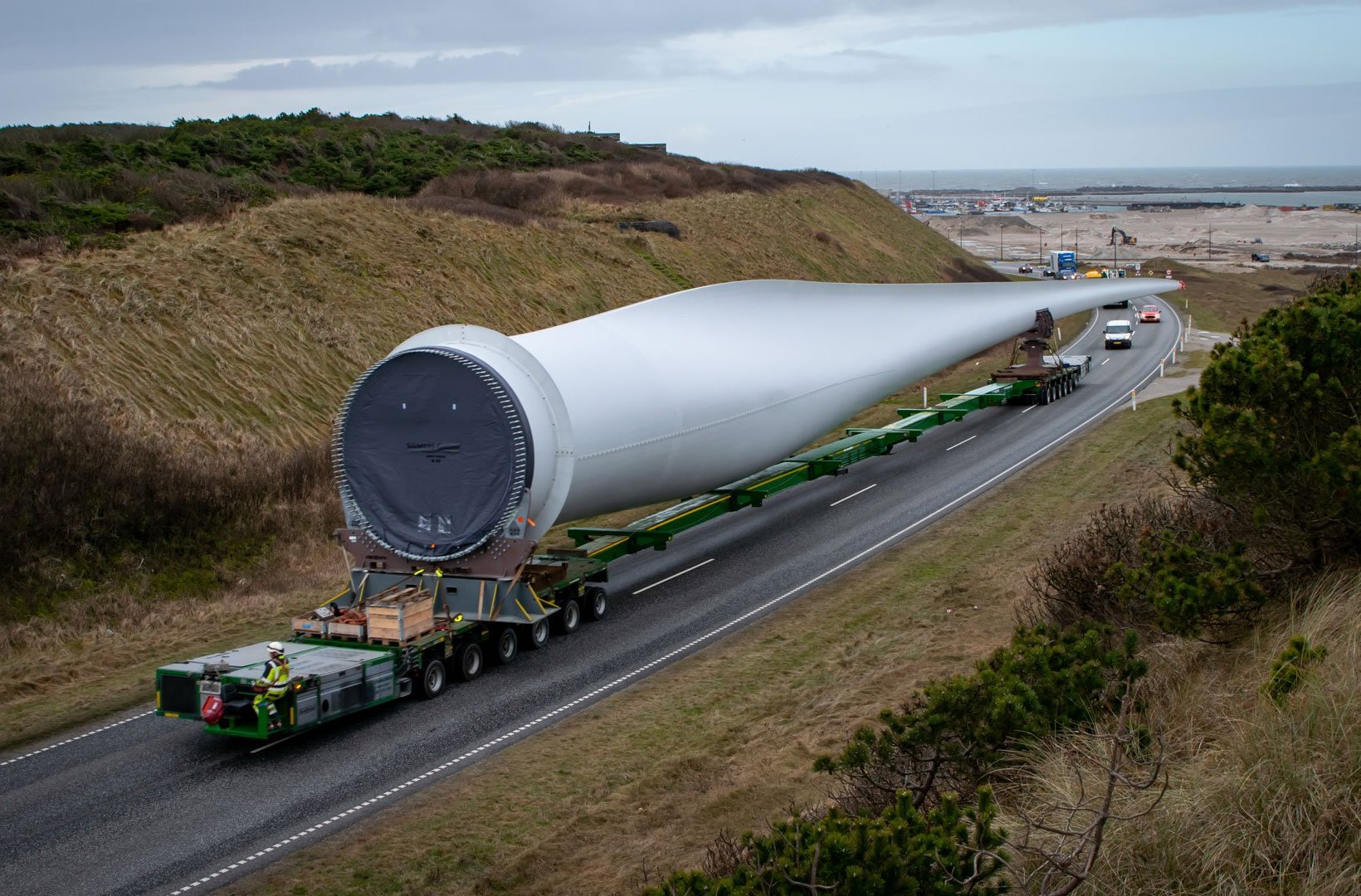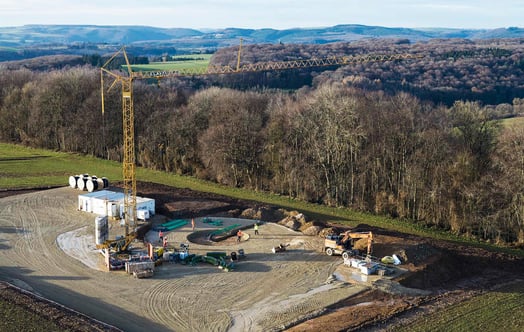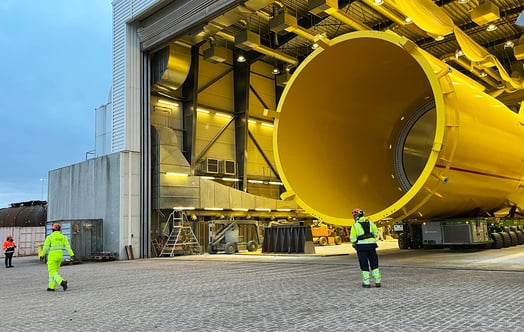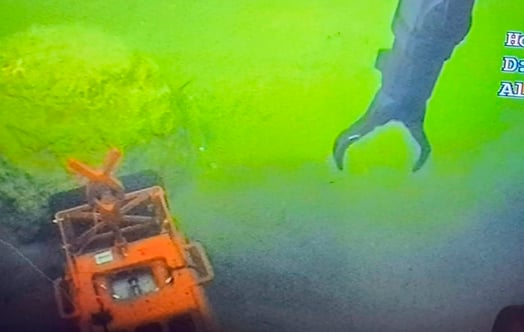
Vattenfall and Siemens Gamesa are working together on the development of the new 11 MW Siemens Gamesa wind turbines for offshore Wind Farm Hollandse Kust Zuid.
Hollandse Kust Zuid will be the first offshore wind farm to install a new series of wind turbines: the Siemens Gamesa Direct Drive 11 MW. These 140 new turbines will be the biggest ever to be installed at scale. To ensure that they will soon be able to supply green energy for decades, Siemens Gamesa is performing intensive tests with a prototype installed onshore in Østerild, Denmark. We spoke with Kevin Metcalfe, Wind Turbine Package Manager at Vattenfall, and with Peter Esmann and Rasmus Holm, Senior Product Manager and Chief Engineer at Siemens Gamesa. They discussed the intensive cooperation between the two companies and the development of these new turbines.
At the start of the collaboration between Vattenfall and Siemens Gamesa, the Siemens Gamesa Direct Drive 11 MW was selected as the turbine of choice for Hollandse Kust Zuid. At that time, each turbine was planned to feature a 193-meter rotor diameter. A few months ago, following an intensive thought process and lots of calculations, it was decided to upgrade to a rotor diameter of 200 meters. Kevin Metcalfe from Vattenfall explains why: “The larger blades result in a ~2,100 m2 increase in the swept area, which is about the size of eight tennis courts. This means the turbines generate even more green energy throughout their lifetime, even at lower wind speeds, which is important for a subsidy-free wind farm such as Hollandse Kust Zuid.”
1,200 Direct Drive turbines at sea
Although the turbine to be installed in Hollandse Kust Zuid is new and the first of its kind to be deployed offshore, it builds on existing technology, says Senior Product Manager Peter Esmann: “This 11 MW turbine is an upgrade of previous Direct Drive wind turbines. We already installed the first prototype of the 6 MW Direct Drive turbine in 2011 and began our first serial production in 2014. There are currently more than 1,200 of our Direct Drive wind turbines installed at sea. In addition to producing green energy, these turbines also transmit information about their operations back to shore. This latest turbine is a larger version of the 8 MW model, which is currently being installed offshore in Vattenfall’s Danish Kriegers Flak project. It features mostly the same technology, although we have optimized a number of things, particularly in the nacelle.”
Open communication
Chief Engineer Rasmus Holm: “For this turbine type, we needed to use carbon blades instead of fiberglass; a more expensive option, but much stiffer and lighter. We also added a hydraulic crane instead of the rail system used on Kriegers Flak for example, to help with the installation and maintenance.” Peter Esmann continues: “Apart from these core design choices, Siemens Gamesa and Vattenfall collaborated well in a process of open communication about the remaining optimization options. This openness was quite unique. As a contracted party, we are used to deliver according to contract. For this project, Vattenfall required us to think further in terms of optimizations and we truly worked together on solutions to make this job a success for both parties – enabling zero-subsidy offshore wind.”
“The decision to extend the rotor diameter to 200 meters did mean that we had to re-evaluate some of the choices we had made earlier,” says Kevin. “For example, the detailed design process for the wind farm had already started. But now we had to reconsider whether the foundations could handle the increased size and loads from the turbines, and whether the in-field cables and electrical equipment could deal with increased production per turbine. We also had to have another look at the installation campaign and ensured that the ships transporting and installing the different turbine parts were able to handle the longer blades and towers safely and efficiently. This whole process involved intensive cooperation with Siemens Gamesa, which was fundamental in getting the project ready to continue with the larger blades.”
95 percent availability
Siemens Gamesa is currently testing a prototype of the new 11 MW turbine onshore in Østerild, at a national test center. Rasmus Holm: “The most important objective now is to deliver all the information we need to obtain the type certification for the new model, so we can start serial production of the 140 turbines. We are also working on the documentation required for the connection to TenneT’s offshore substations. To deliver this information, the prototype is operating continuously, and a service team is permanently available to resolve any problems as they arise and get the turbine running again as quickly as possible.”
Peter Esmann adds: “As a result, the prototype has an availability of 95 percent, which means the turbine is only idle 5 percent of the time. This is quite the achievement, considering all the new technology and components we’re using, so we are very happy about that.”
The biggest challenge: upscaling
The biggest challenge that Siemens Gamesa sees for the coming year is scaling up the production process from a single prototype to serial production of one to two turbines per day. While the towers are almost the same for the 8 MW turbines and production can be scaled up quickly with familiar suppliers, the nacelle contains all kinds of new parts. Kevin: “That is why five pre-serial production nacelles are currently being produced by Siemens Gamesa to ensure that production runs smoothly in the future. This allows us to identify and solve any possible production issues well before the wind turbines need to be delivered.” Next to that, Siemens Gamesa has already started to produce blades for the Direct Drive 11 MW at a reduced pace, to make sure that production process will also run smoothly when it is scaled up.
Both parties are pleased with their unique collaboration so far. Kevin: “We work together to find solutions to every problem. Such a collaborative environment makes it a pleasure to work on this project.”



